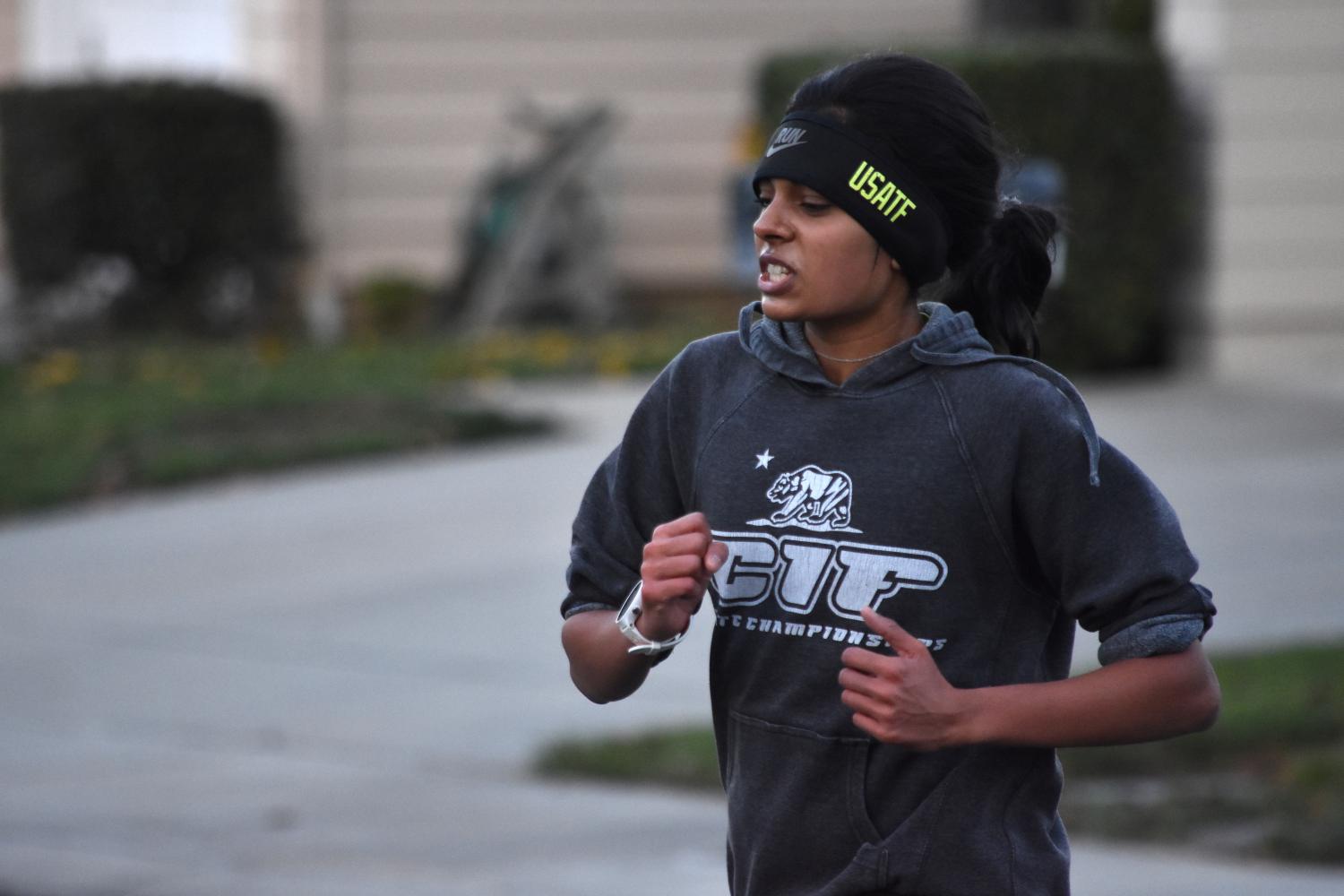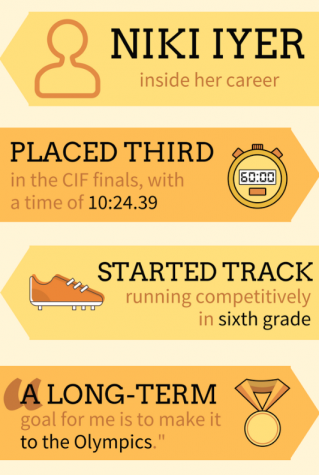Iyer on Fire
Exploring Niki Iyer’s distance running success at Harker
June 11, 2017
It’s a cool afternoon in mid-December, the off-season for a cross-country or track runner. Nikitha “Niki” Iyer (‘17) wears a gray hoodie over black track pants, to ward against the cold. She adjusts a USA Track Foundation sweatband, checks her watch as she walks out of her Cupertino house—and, at the crest of a mile-long loop of road, begins to run.
Her father, accompanying her, has to bike to keep up, cutting across lawns and fields as Niki’s well-used sneakers drum pavement and concrete with a steady, brisk rhythm. She runs past cul-de-sacs, fountains, primary-colored playgrounds; her loose ponytail swings back and forth behind her.
The sun sets in 50 minutes, but by then she will have run a little more than seven miles.
Niki’s pace as she circles her neighborhood—running to run, not to race—still pales in comparison to the speed that won her dozens of distance-running titles, from medaling at the California State Championships to winning gold at the national track and field Junior Olympics.
Though many of us can run fast, running well takes not just talent but technique, persistence and training. From finding time for a sport alongside schoolwork and tackling unfamiliar terrain to maintaining technique, pushing past injuries and succeeding under the pressure of national attention—what goes into making a runner who has made Harker history?
Surprisingly, Niki’s running career started with a different sport entirely—a series of them, in fact.
As a child in Florida, Niki would more likely be found in an ice skating rink than on a track, but a move from Jacksonville to California capsized her cultural perspective and forced her to quit figure skating.
“I had a massive culture shock coming from Florida, where I was kind of the only Indian kid. Things were just really, really different there,” Niki said. “When I came to California, there weren’t any ice rinks by my house, so I felt really lost and I wasn’t sure what sport to try.”
When she transferred from Challenger School to Harker for sixth grade, in 2010, she sampled a battery of different sports offered at the middle school. According to Niki’s father, Shankar Iyer, she briefly took up everything from volleyball and basketball to soccer and swimming—and then she started to run.
“I found the sport very interesting, so I started to run more and more,” Niki said. “I just built up more endurance and more speed throughout my seventh- and eighth-grade years, and that’s pretty much how I got started.”
The summer before she started high school, she competed at the 2013 Amateur Athletic Union Junior Olympic Games, a national event. Her top-10 finishes in the 14-year-old girls’ 800- and 1500-meter races there motivated her to continue running into high school.
“After [the Junior Olympics], I basically went into nonstop running mode, and I really honestly didn’t have a break from running until after my freshman year of high school,” Niki said. “I pretty much just went from track training to cross-country training.”
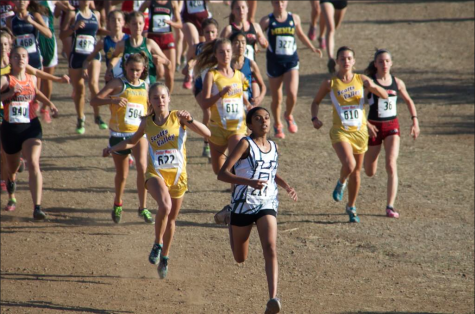
Freshmen Niki Iyer takes the lead on the course, finishing over 50 meters ahead of the second place runner. The cross country team ran its final meet of the season on Oct. 24, 2013, at Crystals Springs.
Running existed before the concept of a sport, even before humans were humans: millions of years ago, Australopithecus sprinted the savannas of eastern Africa. Foot races featured in both the Ancient Olympics and the first modern Olympic Games, and it was a runner—Leonidas of Rhodes—whose record of 12 Olympic gold medals lasted the 2,168 years until swimmer Michael Phelps won his 13th individual gold in 2016.
High school running today has become standardized to include both cross-country in the fall and track in the spring, effectively giving runners two seasons to compete. Cross-country races occur in open air on natural terrain, like dirt or grass; courses are often multiple miles long and differ significantly from each other. Track races, meanwhile, all take place on artificial oval running tracks and can be in- or outdoors.
Although cross-country is currently not an Olympic sport, track events like long-distance running and steeplechase occur at the Olympics. Many track and field Olympians do not start with running, perhaps because it is a comparatively simple sport to learn: a 2016 report by web design company Venngage found that they often begin in their teens, after playing other sports, while other athletes, such as gymnasts, start—and compete—much earlier.
At the beginning of her freshman year, Niki was young and practiced, with three years of serious running since her move to Harker. Almost immediately, she began to break records.
“[Niki] is ferocious. She was that way in middle school, and she brought it to a freshman level here,” upper school head cross-country and track coach Scott Chisam said. “She’s been setting records since her freshman year. Now she’s one of the top in the country and one of the top few in the state.”
At the Junipero Serra Invitational at Crystal Springs, one of the cross-country team’s first races of Niki’s freshman season, she led wire-to-wire and outpaced the Upper School’s course record by 50 seconds.
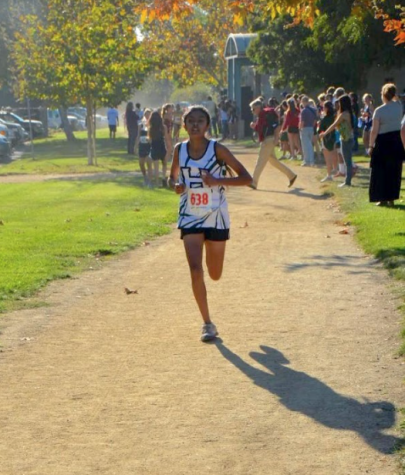
Niki runs in the Crystal Springs race, which she lead wire to wire. She felt that it was one of her most challenging races because of her unfamiliarity with the course.
After finishing seventh in her first five-kilometer run at the California Interscholastic Federation (CIF) State Cross-Country Championships on Nov. 30, 2013, with a time of 18:33, she became the first runner from the upper school to place as highly at a state meet. She also qualified for the Central Coast Section (CCS) finals, a considerable feat for a freshman.
Then, just months later, disaster struck. In the summer of her freshman year, Niki suffered her first major injury: a stress fracture—a small crack in a bone due to recurring strain—in her left tibia, the bone in the lower leg.
“When I started feeling the shin pain, I was like, ‘I don’t know what this is,’” Niki said. “It was just so life-changing because prior to that, I kind of ran with the notion that injuries didn’t even exist. I had no idea how to treat injuries, like how do you come back from it? What are you supposed to do?”
Long-distance runners face both acute injuries, such as broken bones and twisted ankles from severe impacts, and chronic or slow-onset ones, such as knee pain and inflammation in the legs.
Stress fractures appear when fatigued muscles lose the ability to act as shock absorbers, leading to heavier loads on an athlete’s bones that eventually prevent them from repairing themselves. Weeks of rest followed by gradual rehabilitation of the bone are the only way to recover; cross-training, or completing other workouts such as cycling or swimming rather than running, can also help rebuild strength in the bone.
“There’s such a thing as overtraining, where the volume can be too much, where it has a detrimental effect on performance to the point where it causes injury,” upper school head athletic trainer Jaron Olson said. “Often with a chronic injury, the best medicine is rest, and so how do you rest and maintain your fitness at the same time? That can be a bit of a challenge, so often, athletes need to look at some cross-training if they have done too much running.”
Because of her unfamiliarity with injury at the time, Niki’s first stress fracture heavily influenced her approach towards training as she progressed further into high school racing.
“In sixth and seventh grade, I would have no idea what training actually was. I sort of just ran and ran and ran,” Niki said. “[The injury] made me be a lot more introspective of myself and understand that there’s certain limits that you’re pushing, and if you want to be great, there’s so much more dedication needed. You can’t just be the person that’s like, ‘I’m going to work hard 24/7 in an attempt to be successful.’ You also have to work smart, and I think that’s what it caused me to do.”
As Niki continued to run into her sophomore year, she continued on to both state and interstate competitions. She qualified again for CCS, ran in the California State Championship track finals and traveled to Seattle for the University of Washington High School Invitational—but she also began to burn out.
“Sophomore year, I had just gotten into this rut,” Niki said. “I felt like I didn’t even like running that much. I was just kind of bored with it.”
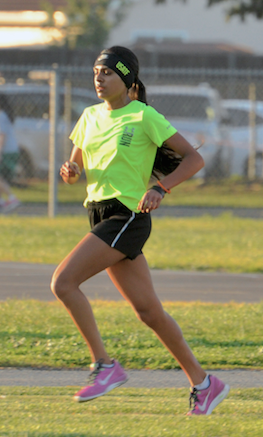
Niki Iyer (10) and Jack Rothschild (11) run laps around the Blackford field as a part of their preseason conditioning. Track and Field practice will begin on Feb. 2, 2015, at Blackford.
Then Niki encountered Lizzie Lacy (Menlo School ‘15), a then-senior in her league who trained with a private coach, Jorge Chen. At the beginning of her junior year, she joined the Menlo iGreyhounds Track Club, a private club founded and coached by Chen.
“I just saw how much fun [Lacy] had with the sport, and I thought that Jorge would be a great person to go to to awaken my pleasure in it and also just have the same sort of improvement that she did,” Niki said. “I felt like at that point in my career, that there were so many little fixes that I needed to do to be a better runner as opposed to completely changing everything. I had to work a lot on my form, and I felt like that was something Jorge really emphasized.”
Chen, whom Niki describes as her “biggest mentor”, helped to create workouts for her along with her coaches at the upper school, emphasizing form and race plans—key elements of preparing for longer-distance runs.
“This sport is one where most elite athletes have a combination of high school and club events,” Shankar Iyer, Niki’s father, said. “Working with Coach Chisam, we learned that Niki does need some specific things around form and technique that Jorge was especially good at, and so we wanted to supplement her high school coaching with some specific training that Jorge could provide.”
As her new teammates welcomed Niki to the club, she made friends and brought her skills and personality to each practice. Niki continued to represent both her private club and Harker at cross-country and track meets throughout junior and senior year.
“Niki has a one-of-a-kind work ethic, and that really shines through in her training,” Niki’s club teammate Robert Miranda, a rising senior at Menlo School, said. “She can be so light and happy and make everyone have a good time during warmups and when we’re getting ready, but as soon as we step on the track and start doing real work, she’s so focused and so intense.”
Beyond Niki’s coaches and teammates, her parents also play complementary and integral roles in her support system and development as an athlete, far from being sidelined supporters.
Niki credits her confidence in her parents from a young age with helping her achieve the level of success that she has: as Niki gained successes in local meets as a middle schooler, her parents encouraged her to continue running.
“This sport is one of the craziest sports: you have constant travel, and it’s just really hard to support your child because you have no idea what your child is actually going through,” she said. “In this entire world, I would actually be willing to make a bet that there’s not two parents that you’re going to find that are more supportive of this sport.”
She describes her father, Shankar Iyer, as “kind of my coach” since a young age, while her mother, Dhanya Iyer, competed as a sprinter when she attended high school in India.
“[My dad] is my coach; he’s my nutritionist; he’s my pep-talk giver; he’s just a lot of things. I think he’s helped me so much for the past four years, and I honestly couldn’t have done anything without him,” Niki said. “My mom just brings so much knowledge and wisdom to the table. She ran, and even though it’s 30-plus years ago, she has so much information and so much knowledge about how women run.”
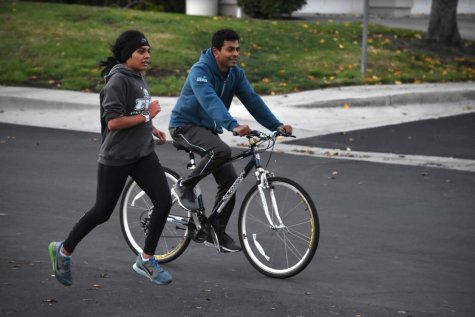
Accompanied by her father on a bicycle, Niki runs in her Cupertino neighborhood on Dec. 17.
Niki’s parents help her with everything from accompanying her at events and practices when her coaches are busy to giving her the emotional support to overcome obstacles in her career.
“The number one thing is just being a big supporter,” Shankar Iyer said. “We try to be her cheerleader, helping her get through those tough times, and where possible, I’ve tried to make sure that I can help her from a skill or coaching perspective, learning from her coaches and filling in the gaps, being there when other coaches are not able to make it.”
Besides the people in her athletic career, Niki also devotes herself to a different type of faith: religion. Even though running takes up the majority of her time, Niki connects to her Hinduism in ways such as volunteering to assist with ceremonies at her temple.
“I come from an extraordinarily religious and devout family. We’re very pious in the sense that we follow every single religious ceremony, and I’m obligated not to eat meat, so I don’t eat that. I try to stay as strict as I can to my religion,” Niki said. “Generally, just volunteering at the temple gives me a lot of peace and bliss.”
After beginning to train with the iGreyhounds, Jorge Chen’s track club, Niki continued to succeed, serving as cross-country team captain, winning WBAL championships and qualifying again for CCS in her junior year last year.
What she describes as her greatest accomplishment soon followed, at the very end of her junior year track season. Niki says her best races and proudest achievements come under “a lot of stress and a lot of attention,” and state-level races like the CIF track state championship finals on June 8, 2016—where she placed third in the 3,200-meter—certainly qualify.
“I came in seeded 10th and ended up placing third. I didn’t even expect to get on the podium, let alone get third,” Niki said. “I just loved the feeling of being under the lights, especially on a track, and having so many people out there cheering me on and so many girls to compete against. That race was a really big deal to me.”
Her time, 10:24.39, was within 13 seconds of the first-place finisher.
“For me, the biggest achievements are the races that are the most surprising or some of the moments that you really don’t expect, and you know that you put in all the hard work and it just comes to you for competition,” Niki said. “Moments like that make me just so ecstatic and unbelievably grateful more than anything, for everything that not just I’ve done but also what my coaches and my parents have supported me with.”
Recurring races like West Bay Area League (WBAL) meets that have spanned Niki’s athletic career from her middle school beginnings, meanwhile, hold significance precisely because they aren’t one-time.
“I really like [WBAL races] because they just remind me of how far I’ve come. I used to do these WBAL meets when I was in middle school, and to kind of see the growth that I’ve had is just really exciting for me. So these really hold a lot of meaning to me,” she said. “It’s really exciting, especially as a senior, to go there because it just brings you back to so many memories and so many times being on a certain podium.”
With an individual sport like running, every race provides Niki another opportunity to reflect on the results of her years of training and preparation.
“I’d actually say that I’m a different person when I’m on the track and when I’m on the course. I’m a lot more aggressive; I’m a lot more firm with what I do,” she said. “The one thing that I always think about running is that it’s taught me, more than anything, how to be tough in life. I feel like there’s so many moments during a race that you just feel like quitting or you just feel like dropping out, and you have to push through all that pain.”
Niki raced at WBAL cross-country meets in October and November 2016 and track meets in March and April, the last of her high school career.
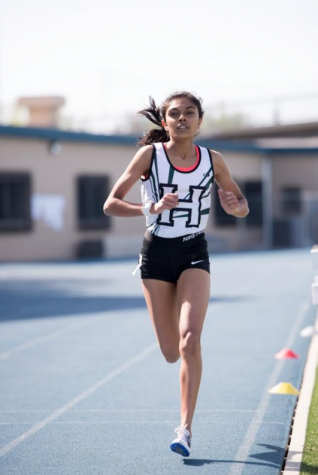
Niki Iyer runs in a track and field meet at Bellarmine College Preparatory in her junior year. She placed third in the 3200-meter at the state championships in Fresno.
She was named league champion for both cross-country and track, and she finished the Nov. 4 cross-country championship race at Crystal Springs with a time of 17:36—half a minute faster than her first high school time on the course, in her freshman year.
“When I was running the league championships, I was half crying when I was running because it’s just so bittersweet,” Niki said. “Getting to be league champion for the third time was really exciting to me, and it’s also really motivating. I didn’t get to run the first league meet because I was coming back from injury, and I’m just really excited to see how far I’m going to be able to push myself with this because I’m really seeing how strong I actually am.”
Niki’s senior year also marked a shift in her academic concentration, which strikes a complex balance with her athletic career. Because seniors are only required to take English if they have completed their arts and computer science requirements, Niki was better able to focus her course load this year towards STEM electives and a lighter course load.
“Even though we all joke about senioritis, I feel like I’m still really into my work,” Niki said. “For me, it’s all about prioritization, especially with this new block schedule. That’s been really helpful, like knowing that there’s certain things I need to get done immediately versus things I need to get done in the future.”
Because of Niki’s high standards and those of her coaches and parents, among her many accomplishments have come losses, too. This season, she placed third with a time of 18:01.8 at the Central Coast Section (CCS) cross-country championship at Crystal Springs on Nov. 12, 2016—less than 20 seconds after the first-place finisher, her league rival.
Dealing with injuries over the course of her athletic career has also taught Niki to learn from not just the injuries she sustains but also races that she doesn’t win or personally dissatisfy her.
“Injuries that most likely I will have in the future will continue to shape me, and I think the losses that I’ve taken in the past have definitely shaped me,” she said. “CCS was a huge enlightening experience for me. I was really, really disappointed with the race, because I know that that was something that I wanted to win, but at the same time I recognize that it taught me you have to be able to push yourself on any given day.”
Niki committed to run for the University of California, Berkeley’s track and field program on Dec. 9, 2016, and signed on April 12. While she had been considering colleges across the nation, she and her family ultimately decided on Berkeley because it best fit her needs, providing a strong athletics program in addition to academic challenges and a well-rounded, supportive team environment.
“She wanted to make sure that [wherever] she went, it was not only good from an athletics perspective but it also gave her the sort of challenges academically that she’s used to at Harker and that she was seeking,” Shankar Iyer said. “The second thing was making sure that she had a good team environment and the support system that she was looking for. It’s very difficult to find a school that has all of those ingredients that she was looking for, and we’re happy that she found it close to home.”
In college, Niki hopes to eventually run at national and international levels, including making NCAAs—Berkeley is a member of the Pacific-12 Conference and in Division I, the highest level, of the NCAA. Another of her goals is to attempt to compete with Team USA as a track and field Olympian at the 2020 or 2024 Summer Games.
“More than anything, my goal is to grow and develop as an athlete,” she said. “My ultimate goal is to make it to the Olympics one day, and I’m really hoping that in five or 10 years I will have hopefully made it to 2020 or 2024.”
As Niki’s high school career came to an end with graduation on May 18 and her last races earlier in May, she reflected on how far she’s come—from her middle school experiences to the growth and progress she’s made from freshman year—but her focus remains on her goals.
“As I continue to push these boundaries, just being able to get to new levels and keep on challenging myself and going to higher-level meets and setting new records always motivates me. I’m really excited to see what I can do in the future,” Niki said. “If you ever run with doubt, you’re never going to be able to reach to your highest potential. That’s something I’ve learned from freshman year, which is you have to run with an open heart—and I think that’s what makes running so great. You don’t really have to think about anything before it or even after it. You’re in the moment, so run fearlessly.”
